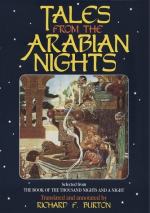A writer in The Athenoeum,[FN#149] objecting to Lane’s modern date for The Nights, adduces evidence to prove the greater antiquity of the work. (Abu al-Hasan) Ibn Sa’id (bin Musa al-Gharnati = of Granada) born in A.H. 615 = 1218 and ob. Tunis A.H. 685 = 1286, left his native city and arrived at Cairo in A.H. 639 = 1241. This Spanish poet and historian wrote Al-Muhalla bi al-Ash’ar (The Adorned with Verses), a Topography of Egypt and Africa, which is apparently now lost. In this he quotes from Al-Kurtubi, the Cordovan;[FN#150] and he in his turn is quoted by the Arab historian of Spain, Abu al-Abbas Ahmad bin Mohammed al Makkari, in the “Windwafts of Perfume from the Branches of Andalusia the Blooming"[FN#151] (A.D. 1628-29). Mr. Payne (x. 301) thus translates from Dr. Dozy’s published text.
“Ibn Said (may God have mercy upon him!) sets forth in his book, El Muhella bi-s-Shaar, quoting from El Curtubi the story of the building of the Houdej in the Garden of Cairo, the which was of the magnificent pleasaunces of the Fatimite Khalifs, the rare of ordinance and surpassing, to wit that the Khalif El Aamir bi-ahkam-illah[FN#152] let build it for a Bedouin woman, the love of whom had gotten the mastery of him, in the neighbourhood of the ’Chosen Garden’[FN#153] and used to resort often thereto and was slain as he went thither; and it ceased not to be a pleasuring-place for the Khalifs after him. The folk abound in stories of the Bedouin girl and Ibn Meyyah[FN#154] of the sons of her uncle (cousin?) and what hangs thereby of the mention of El-Aamir, so that the tales told of them on this account became like unto the story of El Bettal[FN#155] and the Thousand Nights and a Night and what resembleth them.”
The same passage from Ibn Sa’id, corresponding in three MSS., occurs in the famous Khitat[FN#156] attributed to Al-Makrizi (ob. A.D. 1444) and was thus translated from a Ms. in the British Museum by Mr. John Payne (ix. 303)
“The Khalif El-Aamir bi-ahkam-illah set apart, in the neighbourhood of the Chosen Garden, a place for his beloved the Bedouin maid (Aaliyah)[FN#157] which he named El Houdej. Quoth Ibn Said, in the book El-Muhella bi-l-ashar, from the History of El Curtubi, concerning the traditions of the folk of the story of the Bedouin maid and Ibn Menah (Meyyah) of the sons of her uncle and what hangs thereby of the mention of the Khalif El Aamir bi-ahkam-illah, so that their traditions (or tales) upon the garden became like unto El Bettal[FN#158] and the Thousand Nights and what resembleth them.”
This evidently means either that The Nights existed in the days of Al-’Amir (xiith cent.) or that the author compared them with a work popular in his own age. Mr. Payne attaches much importance to the discrepancy of titles, which appears to me a minor detail. The change of names is easily explained. Amongst the Arabs, as amongst the wild Irish, there is divinity (the proverb says luck) in odd numbers




